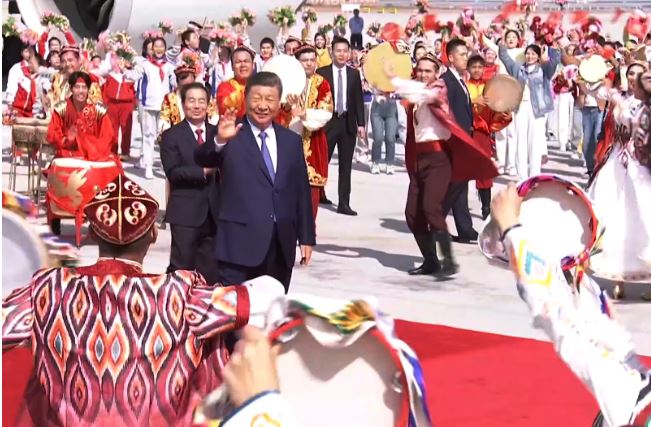In this image made from Chinese state media video, Chinese President Xi Jinping arrives in Urumqi, Xinjiang Uygur Autonomous Region, Sept. 23, 2025. (CCTV via AP)
- Xi Marks 70th Anniversary of Uyghur Autonomous Region Amid Celebrations
- But Uyghurs Recall East Turkistan’s Lost Independence and Ongoing Genocide
23 September 2025, Turkistan Times
Chinese President Xi Jinping visited Urumqi on September 23, leading a high-level delegation to mark the 70th anniversary of the establishment of the Xinjiang Uyghur Autonomous Region. His arrival, greeted by state-organized celebrations of dancing and flower-waving crowds at the airport, was hailed by Chinese state media as a symbol of “unity and progress.”
According to Xinhua, Xi met with representatives of ethnic groups and called for joint efforts to build a “beautiful Xinjiang in the process of Chinese modernization.” He was accompanied by senior Communist Party officials Wang Huning and Cai Qi.
This marks the first time a Chinese president has attended the founding anniversary of the region, which was formally established in October 1955. With a population exceeding 25 million, the region is home to at least 10 million Uyghurs, a predominantly Muslim Turkic people who make up around 45% of the population.
Historical Background
The region, known as East Turkistan to many Uyghurs, was renamed “Xinjiang” — meaning “new territory” — in 1884 by the Manchu Qing dynasty after its conquest. Uyghur communities have long asserted that the term itself reflects a colonial mindset, erasing indigenous sovereignty and identity.
International Concerns and Uyghur Genocide Allegations
Despite Beijing’s official narrative of unity, the visit comes against the backdrop of mounting allegations of systemic repression. In 2021, the U.S. State Department determined that China’s policies in the region constituted genocide, citing mass arbitrary detention of over one million Uyghurs, torture, forced sterilizations, and restrictions on religion, language, and movement.
Human rights groups have also linked state-backed forced labor programs to major Chinese industries, including mineral extraction, raising concerns about global supply chains. Earlier this year, RFA reported increasing online censorship in East Turkistan, deepening the already tight controls on freedom of expression.
Uyghur diaspora groups continue to accuse Beijing of pursuing policies aimed at erasing Uyghur culture, faith, and identity. The Turkish state-run Anadolu Agency notes that despite China’s repeated denials, the Turkic Muslim community continues to face cultural, religious, and economic discrimination.
Strategic Significance
Covering one-sixth of China’s landmass, the Uyghur Autonomous Region occupies a vital position on the historic Silk Road, serving as a gateway between China and Central Asia. It connects Beijing to the Arabian Sea through the Karakoram Highway in Pakistan and shares borders with eight countries, including Kazakhstan, Kyrgyzstan, and Afghanistan via the Wakhan Corridor.
Broader Political Context
Xi’s attendance follows a similar move earlier this year when he became the first Chinese president to join the anniversary of the Tibet Autonomous Region. Analysts see these visits as part of Beijing’s strategy to tighten control over its autonomous regions while showcasing unity under the banner of “Chinese modernization.”
For Uyghurs, however, the anniversary is overshadowed by what rights groups and survivors describe as an ongoing Uyghur genocide, leaving the question of autonomy largely symbolic amid deepening repression.

